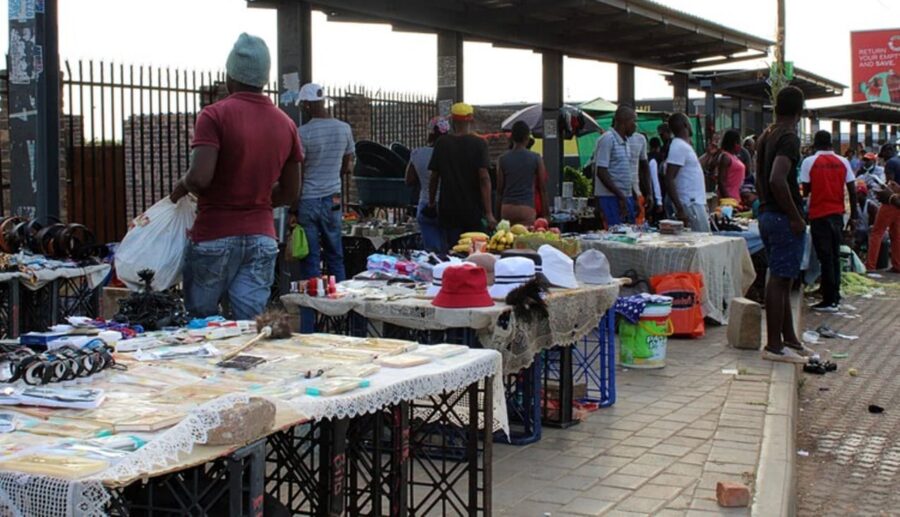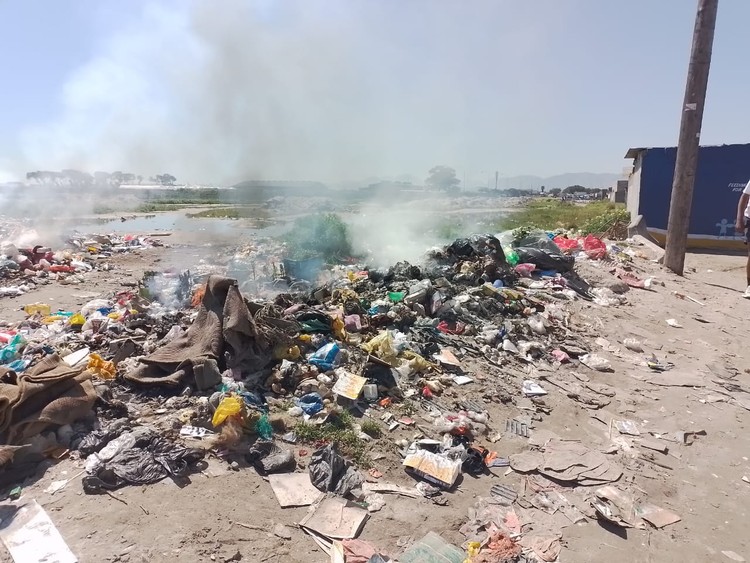
Extortion rings prey on poor communities
An owner of a fruit and vegetable stall in Philippi says he must pay a gang R500 a month not to rob him

The owner of a fruit and vegetable stall in Philippi says he has to pay a R500 “protection fee” to a gang each month not to rob him.
- Residents, informal traders and small business owners in townships across Cape Town are often at the mercy of extortion syndicates.
- We spoke to vendors who pay R500 a month to armed gangs or risk being robbed or injured. Sometimes they must pay off more than one gang.
- Armed criminals demanding protection fees have also forced the City of Cape Town to suspend basic services in Gugulethu, Nyanga and Philippi East.
While criminals threatening local residents, businesses and municipal workers is not new, there appears to be a spike in violent extortion-related incidents in Cape Town’s townships.
Frequent threats of violence from criminals demanding protection fees have forced the City of Cape Town to suspend essential services, such as waste collection, in several communities, including areas in Gugulethu, Nyanga and Philippi East. The City said a flare up of gang violence in Manenberg has led to the temporary withdrawal of services there until the area is calm again.
The latest incident happened in Gugulethu on Monday, when refuse collection teams reported being followed and threatened by armed men in vehicles.
A lack of proper and visible policing in many townships has left residents and informal and small businesses at the mercy of these gangs, who target roadside meat sellers, barbershops, salons, shebeens and spaza shops.
GroundUp spoke to victims in Philippi, Nyanga and Gugulethu. Their names have been withheld to protect their identities because they are terrified of the criminals.
A fruit seller in Philippi told us: “These protection fee guys are taking food out of our mouths, because we have to pay money we don’t have. Many businesses around here have closed because they cannot afford the exorbitant [protection] fees. They have guns and wear face masks. We are helpless and hopeless. This has to stop, but who is going to stop them?”
A salon owner in Nyanga said, “I used to pay R1,500 a month. When I couldn’t pay anymore, I stopped operating. Sometimes they used to collect [the money] twice a month and we can’t argue with them because they are armed and threaten to kill if we don’t follow their demands.”
She said the situation became unmanageable when multiple groups started collecting from the same businesses.
A meat seller in Philippi East said she also pays R500 per month to criminals. “This protection fee is killing our businesses. We can’t even report it to the police because that will require that I open a criminal case which would lead me to going to court and expose myself. I am scared of these guys,” she said.
Communities suffer as police fail
The complete withdrawal of services in some communities and in others having general workers operating under police escort has far-reaching consequences for thousands of people who live and work in these places.
In a statement on Tuesday, the City said its Urban Waste Management directorate has called on SAPS to take urgent action against the perpetrators of protection schemes. “Criminals cannot be allowed to hijack service delivery in this way,” said Grant Twigg, Mayco Member for Urban Waste Management.
“The City’s Urban Waste Management is exploring various ways to restore services as soon as possible including continuing to work with the Safety and Security directorate,” he said.
In an incident in Nyanga on 28 September, waste collection workers were busy in Fenqe Street when they were approached by eight armed men demanding a protection fee. They robbed one staff member of his phone. A similar incident occurred in Philippi East on 15 September, which led to the temporary suspension of services in the area.

anti-extortion campaign
The City plans to launch an anti-extortion campaign to encourage more people to report these incidents to assist police and law enforcement to better identify protection racketeers.
In the meantime, the City said it has deployed more security and law enforcement officers to critical hotspots.
City spokesperson Luthando Tyhalibongo said, “Extortion is primarily run by well-organised, lucrative and expert syndicates. Importantly, a variety of projects and programs are impacted by extortion and related criminal activity.”
Tyhalibongo said extortion was affecting all directorates within the municipality.
“We are standing with our teams and communities to step up our efforts to help bring these well-organised crime syndicates to book. Extortion is destroying livelihoods, City community projects, and the wellbeing of us all,” said Tyhalibongo.
ALSO READ: Protect yourself from Cybercrime
Tyhalibongo said the police also have an Extortion Task Team whose main mandate is to investigate these cases which are usually linked to gangs.
SAPS Western Cape spokesperson Andre Traut said that extortion was “very high on the priority list” of police in the province.
He urged people in the Western Cape to call the SAPS toll-free extortion hotline (021) 466 0011 or Crime Stop on 08600 10111.
“Cases that have been reported to SAPS are currently under investigation and some of these cases are being heard in court. Due to the sensitive nature of our investigation, the finer details cannot be divulged at this stage,” said Traut.
